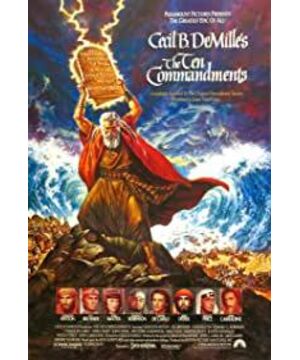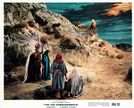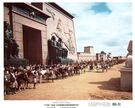Eight Questions of the Ten Commandments
The title of "The Ten Commandments" is attractive, but the 4-hour time is a bit scary, and it took a long time to decide to start watching. The structure of the 1956 film was different. Before the main film began, there was a prelude stage that only played music, and an opening statement, and then the curtain opened and the film began. The list of studios, stars, and producers is at the front. It's really different! There is an intermission in the middle, or the curtain rises and the music is added. Next is the content.
The content of the story comes from the Bible. As God's "direct" people, the Israelites were slaves for 400 years in Egypt, responsible for building cities, pyramids, sphinxes, pharaoh statues, etc. The Israelites suffered and cried. The voice finally moved God and sent a deliverer to be reborn as an Israeli baby to help them break free from bondage and find their homeland. What is interesting is that the baby grew up in the Egyptian palace and became a prince highly valued by Pharaoh, and even had the hope of becoming a future Pharaoh; and that Prince Moses didn’t even know that he was an Israeli, and he didn’t even know that he shouldered such a seemingly Impossible mission. It is said that the literary value of the Bible is very high, and it can be seen from the setting of this story that it is very unusual!
After reading it, I thought of a few questions: 1. Why were the Israelites enslaved for 400 years? I found the following answers, and I am satisfied.
Myth 1: The ancestral name of the Jewish people is Jacob (pronounced Yargubai in Arabic), the son of Jacob Isaac, the grandson of Abraham (pronounced Ibrahim in Arabic), and later renamed Israel, which means "with the God's Wrestler", and because he injured his hamstring while fighting the gods, the Jews had to pick out the hamstring and discard it when they slaughtered animals. According to legend, Jacob had 12 sons. Due to Joseph's relationship, he migrated to Egypt in the second year of the seven famine years. Privilege (about 15th century BC), who lived in the lower Nile and turned into an agricultural people. After the Hyksos were driven out of Egypt by the Nubian riots, the status of the Israelites plummeted and they became slaves to the Egyptians.
Myth 2: After Jacob's son Joseph was sold to Egypt by his own brothers, because Joseph was always with Jehovah and never stole the glory of God, Joseph was also a person chosen and loved by God, and God gave him an extraordinary person wisdom, and guide him in many things. Joseph later became the prime minister of the king of Egypt, and Egypt entrusted all the affairs of the country to Joseph. Later, the land of Canaan and Egypt experienced severe drought for seven years, but because Joseph obeyed God's revelation, he had already stored a large amount of food in the seven-year harvest year. However, his father Jacob and his eleven-year-old brothers in Canaan had no food storage, so they had to go to Egypt to buy food. There is a touching scene of Joseph and his brothers recognizing each other while shopping for food. Due to the severe drought, Joseph sent his father Jacob, his brothers and more than 70 family members to Egypt to avoid the drought. That's why the Israelites went down to Egypt.
After their entire family arrived in Egypt, because the Egyptian king trusted Joseph at that time, the Jacob family was well received and accommodated by the Egyptian king, and the entire family lived very prosperously in Egypt. The Israelites in Egypt also "become fruitful and prosperous, and are exceedingly powerful, filling the land." (Exodus 1:7) After the king who believed in Joseph died, "a new king, who did not know Joseph, rose up and ruled over Egypt." "And he said to his people, 'Behold, the people of Israel are more numerous than we are, Stronger than we are. Come! Let us deal with them with bitterness, lest they multiply, and if there is any war in the future, they will join our enemies against us and leave the land.' So the Egyptians sent governors The laborers have dominion over them, burdening them with affliction.” (Exodus 1:8-11) Thus the Israelites began to become slaves to the Egyptians.
2. Why did God decide to help the Israelites after 400 years of slavery? The explanation is as follows:
In fact, if we study the Bible carefully, we will find that God had already determined that the Israelites would be slaves in Egypt for 400 years when he made a covenant with Abraham. "The LORD said to Abram, 'You must know for sure that your descendants will be sojourners in another land, and they will serve the people of that land, and the people of that land will afflict them for four hundred years.'" (Exodus 15: 13) "God said: 'His descendants will be foreigners, and they will make them slaves, and they will afflict them for four hundred years.'" (Acts 7:6) The fact that the Israelites were slaves in Egypt for four hundred years It just shows that God is a covenant-keeping God and an unchanging God.
So why did God send his people to Egypt to be slaves? In the Bible, God does not explain his intentions, and it is difficult for us to speculate. But the Bible says: "In the fourth generation they shall return to this place, for the iniquity of the Amorites has not yet been full." (Exodus 15:16) This seems to mean that the land of Canaan was inhabited by other The people of Israel, such as the Amorites, had to kill or drive away the people of the land in order to have the land of Canaan. But God thought that the sins of the Amorites were not yet full, and he did not allow the Israelites to destroy them. In this way, Israel did not have a foothold in Canaan, so they had to go to Egypt and live there. Although they lived in Egypt as slaves and suffered miserable treatment by the Egyptians, they multiplied in Egypt and their numbers continued to increase. Four hundred years later, there were more than two million people. Of course, there may be other reasons besides this. For example, the sons of Jacob did not fear God, but were far from God. They committed murder (to kill Joseph), adultery (Reuben) sleeping with his father's concubine), etc., God will punish those who do not fear him.
God has his own authority, he can act according to his own plan, and although we cannot guess God's will, we believe that his plan is good. As the Bible says: "We now seem to be looking in a mirror, blurry, and then we will meet face to face. What I know now is limited, and then I will know it all, just as the Lord knows me. (1 Corinthians 13:12)
3. Wouldn't it be easier if Moses succeeded the pharaoh of Egypt, as his adoptive mother and lover wanted, and then rescued the Israelites? It won't hurt Moses' family and relatives. Why did God let him go another way? Of course, this is the feeling of watching a movie. In the movie, Moses is very likely to become the new pharaoh, and it may not be so simple in history.
4. Ramses had seen that the gods of the Israelites were so powerful that he had the guts to hold on until his own child died, and then he had to let Moses take the Israelites away. Then he was suddenly stimulated again, and led his troops to chase and kill. After God once again showed his power to stop the army with a pillar of fire and split the sea for the Israelites to cross the sea, he dared to let his chariot enter the sea split by the God of the Israelites. They chased and killed them all, and then they were all buried by the waves. This design is a bit too much, and Ramses has simply become a brainless fool.
5. What happened to the Israelites after they left Egypt? Found the promised land full of milk and honey?
The Bible records that the Israelites migrated and conquered Canaan after 40 years. In this process, Moses first grew old, and Joshua became the leader. After the conquest of Canaan, Joshua was also gone. The period from the death of Joshua to the formation of the unified kingdom is called the period of judges. After the Israelites initially completed their occupation of Canaan, for a long period of time, they could not completely drive out or eliminate the remaining Canaanites in the areas under the jurisdiction of various tribes. Influence. The first chapter of Judges records enough information to illustrate this situation. For example: "Benjamin did not drive out the Jebusites who lived in Jerusalem, and the Jebusites were still living with the Benjaminites in Jerusalem"; "Manasseh did not drive out the inhabitants of Bethian and the village of Bethshan" ; "Ephraim did not drive out the Canaanites who lived in Gezer, so the Canaanites still lived in Gezer, in the midst of Ephraim" (Judges 1:21,27,29). In addition, Zebulun, Asher, and Naphtali did not drive out the Canaanite inhabitants in their area, and mixed with them (Judges 1:30-33). Later, the Israelites and the native Canaanites developed to intermarry and were influenced by the paganism of the Canaanites. The Bible says: "Israel lived among the Canaanites, took their daughters as wives, gave their daughters to their sons, and served their gods (Judges 3:5-5) 6).During this period, the various tribes of Israel were independent, unable to unite and cooperate to deal with the invasion of the surrounding foreign forces, each tribe had its own leaders, and the leaders of these tribes were called "Judges".
The Judiciary period was a transitional period before the Israelites established a unified nation-state. During the period of the judges, the judges were only the civil rulers and military leaders of a certain tribe or tribes, not the leaders recognized by all the tribes of Israel. During this period, the organization among the various tribes was quite loose. Facing the threats and attacks of the surrounding foreign enemies and the powerful Philistines, the Israelites gradually realized the necessity of uniting and establishing a strong organization. In the battle against the enemy, I have experienced the superiority of having a wise and courageous leader for unified command. This is the basic reason why the plural rule in the period of the Judges is bound to transition to the rule of a unified national unit.
During the period of the unified kingdom, there was Saul first, then David and Solomon. David reigned for forty years (about 1013-973 BC), and his achievements were brilliant. At the beginning of his ascension to the throne, his first action was to capture the fortress of Jerusalem from the Jebusites and make it the capital of the kingdom. This move has many meanings: the original Hebron was too partial to the southern border and was not suitable as a political center connecting the north and the south; the second is that although Jerusalem is in the territory of Benjamin, it has always been occupied by the Jebusites. , it does not belong to any tribe, and it will be beneficial to the unity of the tribes to be the capital of the kingdom. In addition, Jerusalem is strategically located at an altitude of 810 meters, 1,200 meters above the level of the Dead Sea. There are canyons on its east, south and west sides, and the north is connected to the northern highlands. The terrain is easy to defend and difficult to attack. It has the potential to become the national political and military center. of superior conditions.
The ancient enemies of the Israelites, the Philistines, had taken advantage of the unstable situation in the early days of David's establishment in an attempt to subvert them. David twice defeated the Philistines in the Valley of Rephaim, southwest of Jerusalem (2 Samuel 5:17-25). Afterwards, David welcomed the Ark of Jehovah into Jerusalem with a solemn ceremony, and started planning to build the Temple of Jehovah, making Jerusalem the religious center of the country. However, because the four borders had not yet subsided, and David still had a heavy task of conquest, the plan to build the temple could not be implemented. He continued to subdue Moab, Edom, and Amalek militarily, marched north to Aram, captured the city of Damascus, established a stronghold, and finally completely defeated the combined army of Ammon and Aram, and killed the Aram general Shopha. , a major victory. So far, the territory of the Kingdom of David has been greatly expanded, including the Jordan River in the east, Mount Lebanon in the north, all of Syria, and the Philistines in the southwest, extending to the border of Egypt. At the height of the Davidic dynasty, the territory of the reign was close to the promise made by the patriarch Abraham, which included "the land from the river of Egypt to the great river Euphrates" (Genesis 15:18). In addition to his military victories, David also carried out the construction of state institutions and internal affairs, setting up official positions such as prime minister, marshal, historian, secretary, chief priest, etc. (2 Samuel 8:15-18; 20:23).
Solomon ascended the throne and inherited the vast territory of his father David: northeast to the Euphrates River, southeast to the Gulf of Aqaba, southwest to the border of Philistines and Egypt. King Solomon was ambitious, and his decisions and judgments were wise and tactful. He vigorously strengthened the ruling state apparatus, divided the country into twelve administrative districts, and added various official positions to facilitate administrative rule and collect central taxes. Solomon also strengthened the defense construction of the capital Jerusalem, extended the Jerusalem wall, and established six fortified cities outside Jerusalem, including Megiddo, Hazor, and Gezer. Also built a storehouse, a vehicle depot, a horse farm and so on. So far, a horse farm in the Solomon era has been excavated in Megiddo, and the remains of a metal smelter in the Solomon era have been found in Ezion Geber (now Eilat) at the northern end of the Gulf of Aqaba. In Solomon's time, based on the port of Eilat, he developed maritime trade. His trade fleet sailed in the Red Sea, the Mediterranean Sea, and as far as Africa, India and other places.
Another important work of Solomon was the construction of temples and palaces. He completed the construction of the temple that his father David had failed to accomplish, and it is said that the construction of the temple took seven years. The sixth chapter of "1 Kings" and the third chapter of "2 Chronicles" record in detail the process of building the temple and its grand scale. This temple was later known as the "First Temple". In addition, Solomon spent thirteen years building magnificent palaces and other buildings, including the Palace of Pharaoh's Daughter, the Palace of Lebanon, the Column Corridor, and the Throne Hall. For the construction of the above project, Solomon entered into a construction contract with the king of Tyre in Phoenicia, and the people of Tyre and Sidon supplied building materials and construction personnel. Solomon paid twenty cities in the land of Asher as the price. King of Tyre (1 Kings 9:11-13).
King Solomon developed friendly relations with neighboring countries. He married the Egyptian pharaohs and made the neighboring countries come to pay homage and visit. The ever-famous Queen of Sheba (at the southernmost tip of the Arabian Peninsula, present-day Yemen) also led a large number of officials to visit. The beauty of Solomon's palace and the wisdom of King Solomon's questions and answers made the queen "astonished to the gods" (1 Guardians 10:5) and left a beautiful legend about the queen and Solomon to this day.
During the forty years of King Solomon's reign, his achievements in politics, economy and diplomacy were further developed than those during the reign of his father David. The reign of David and Solomon can be said to be an unparalleled golden age of Israel's national unity kingdom.
The period of kingdom division in the history of the Hebrew nation refers to the division of the unified kingdom into the north and the south after the death of King Solomon. The northern kingdom of Israel died in Assyria in 722 BC, and the southern kingdom of Judah died in Neo-Babylon in 586 BC. Up to 350 years of history (about 933 to 586 BC).
During the period of dividing the country between the North and the South that began in the tenth century BC, from the two prophets Elijah and Elisha to the four famous prophets who left scrolls in the eighth century BC, their greatest contributions were all in establishing the single God, Jehovah. the belief of the gods, resolutely and uncompromisingly waged an irreconcilable struggle against the worship and customs of alien gods, and thereby revealed all the important attributes of the one and only God, who did not express revenge, punishment, and jealousy in the early days. God, but a God full of love, mercy, goodness, faithfulness, justice, and peace. A God with these basic attributes, his requirements for the behavior and ethics of the world are naturally the embodiment of these attributes, which is to return to the conclusion synthesized by the prophet Micah, that is, one should "do justice, love mercy, and be humble. heart, walk with your God" (Micah 6:8).
In 586 BC, the southern kingdom of Judah fell in Neo-Babylon, the city of Jerusalem and Solomon's Temple were destroyed, and the elite and the upper classes of the kingdom were taken captive into Babylonian foreign countries and entered the period of Babylonian captivity. This period lasted for nearly half a century. In 538 BC, King Cyrus of Persia (Cyrus 590-529 BC, also known as King Cyrus) rose up and released the captives of Judah back to Palestine. From 586 to 538 BC, this period is called the period of exile.
Then, the Persian Empire, the Greek Empire, the Ptolemaic Dynasty, the Seleucid Dynasty, the Roman Empire. The Jewish uprisings against Roman rule, especially the last two great uprisings in AD 70 and 135, were historically known as the "Jewish Wars". During these two Jewish wars and previous uprisings, at least 1.5 million Jews were slaughtered. The remaining surviving Jews were forced to flee Palestine and dispersed around the world. The Jews ended their ancestors' history in Palestine for about 13, 400 years, and entered another period of 18,900 years of great national diaspora.
Try to recall the subjugation experienced by the Jewish nation. The simple process of captivity and diaspora: In 722 BC, the northern kingdom of Israel was destroyed by King Sargon of the Assyrian Empire (Bible name: Sargon). It has been assimilated by foreign races for a long time, resulting in the "lost ten tribes" in its national history. In 586 BC, the southern kingdom of Judah fell under the hands of the Neo-Babylonian king Nebuchadnezzar. The residents of the southern kingdom were successively taken captive to Babylon, and the other part fled to the Aswan region of Egypt. The people who were taken captive to Babylon spent half a century of hardship in a foreign land. By 538 BC, King Cyrus of Persia (Bible name: King Cyrus) announced the release of the captives to return to their homeland and rebuild the Temple in Jerusalem. At that time, only a part of the Jews could return to Palestine, and the other part had settled in foreign countries. After the long years of the rule of the Persian, Greek and Roman empires, the Jews will inevitably expand and migrate to other areas under the rule of the above-mentioned empires. After the "Jewish War", the Romans completely expelled the Jews from the holy city of Jerusalem. Since then, Jews have begun a long process of diaspora on a larger scale and on a larger scale around the world. "Diaspora Jews" - the English name Diaspora refers to all the Jews who were scattered outside of Palestine in various historical periods. general name.
6. How much of the Exodus from Egypt is true?
https://www.pinlue.com/article/2019/08/0223/019441540715.html
7. What do the Israelites now believe?
Israel's main religion is Judaism.
According to a survey by the Israel Demographic Office, 76.1% of Israelis believe in Judaism , 16.2% in Christianity, 2.1% in Islam, 1.6% in Druze, and 3.9% in other beliefs.
Israel is the birthplace of the world's major religions, Judaism, Islam and Christianity. The Jewish ancestors were the Hebrews, a branch of the ancient Semites. Originated in Mesopotamia about 4000 years ago.
Judaism is the earliest and oldest religion among the three major monotheistic beliefs in the world, and it is also the way of life and belief of the Jewish people. The main commandments and teachings of Judaism come from the Torah, the first five books of the Bible.
The most important teaching of Judaism is that there is only one God, the invisible and eternal God. He wishes all men to do justice and love mercy, because God made man in his image, so man should be treated with dignity and respect.
8. The difference between Judaism and Christianity:
Author: Loony Luna Link: https://www.zhihu.com/question/40289950/answer/187432816 Source: Zhihu The copyright belongs to the author. For commercial reprints, please contact the author for authorization, and for non-commercial reprints, please indicate the source.
The early believers of Christianity and Judaism were Jews, and Jesus was also Jewish, and the twelve disciples of Jesus were also Jews, which is not surprising, because Christianity was born out of Judaism.
To understand the difference between Judaism and Christianity, it is necessary to review the history of Judaism.
The history of the Jewish people is a cruel and oppressed history. Except for the brief period of peace of a century after the founding of the state, they were successively conquered and enslaved by many powerful peoples in the Mediterranean region. The Jewish people strongly hoped to be liberated. The glory of the nation was restored from humiliation, which led to the "Messiah Movement" within Judaism. After the third century AD, during the rule of Seleucia and the Roman Empire, this prophecy spread more and more widely. The content is that God will send Messiah. As his messenger on earth, Isaiah led the Jews into the millennium without suffering. (The "Messiah Movement" was ultimately driven by the need for Jewish national liberation, from which we can see that Judaism is national rather than universal.)
At the same time, Judaism has diverged in the process of development, and has various branches, such as the Sadduces representing priests and nobles, representing the middle class and intellectuals (and knowledge in the modern sense). The elements are different, the religious elite) is the Pharisees, the peasants and herdsmen are represented by the Essenes (the Pietists), the radicals are represented by the Zealots (the zealous and honest), etc.,
One of the various sectarian branches first discovered Jesus of Nazareth of Galilee, recognized him as the "Messiah", and gradually disengaged from the orthodox diehards (mainly Pharisees) Judaism formed the embryonic form of early Christianity.
We conclude that the Jewish "Messiah" and the Christian "Jesus" are the same person.
But why doesn't Judaism recognize Jesus as the "Messiah"?
This goes back to the "Messiah Movement" just mentioned. Judaism believes that the "Messiah" will end the enslavement of the nation and lead them into the kingdom of God's happiness on earth and into the "millennium" without suffering , but Jesus and his supporters apparently failed to do this, and they claimed that the kingdom of God has disappeared from the earth, and the only way people want to enter him is to enter the kingdom of heaven by virtue of the soul after death , or , the kingdom of God is in the hearts of men. "Messiah" did not make the national hope a reality, but only made a positive development of the doctrine that moved it beyond the narrow thinking of the nation.
The wider preaching of Jesus as an adult and his followers aroused resentment among the Orthodox Pharisees of Judaism, who believed that the teachings he conveyed did not conform to the laws of Judaism itself, and that, to the rulers of Rome, Jesus and his The believers were a potentially threatening group of social revolutionaries and rioters, so the end result was that the Pharisees united the upper echelons of the Roman Empire and crucified Jesus.
Three days later, Jesus resurrected and instructed his disciples to spread the gospel of God to distant places. From then on, the influence of Christianity went beyond Judaism, and later gradually surpassed the borders of the Roman Empire and became a universal religion.
Statement 2:
Author: Kenichiro Hirano Link: https://www.zhihu.com/question/40289950/answer/1418946331 Source: Zhihu The copyright belongs to the author. For commercial reprints, please contact the author for authorization, and for non-commercial reprints, please indicate the source.
First of all, the origins of Judaism and Christianity are the same, they both believe in God, but Christianity believes that the advent of Jesus is the arrival of a new era, so they began to create the New Testament and spread the gospel. Judaism, on the other hand, believes that Jesus is a madman, the new era of the Messiah has not come, and the "Old Testament" and ancient traditions have always been maintained. If we want to truly recognize the dialectical relationship between Christianity and Judaism, we can analyze it from two perspectives.
Christian Perspective: Early Christians didn't think of themselves as a new religion, they just felt that as Jews they had witnessed the coming of the Messianic (ie Jesus) age, and the Jews, their own countrymen, just didn't believe in the Messiah The arrival of Saiyan. Therefore, Christianity persuaded Jewish believers to join Christianity, hoping to make their compatriots better Jews. At the same time, they generously incorporated the Gentiles into Christianity, sharing with them the expectations of the God who belonged to the Jews, so as to achieve what the Old Testament called "the return of all nations to Zion."
Judaism Perspective: They also don't think Christianity is a new religion because they believe in the Old Testament and the same God. They believe that Christianity is a heretical religion within Judaism. They keep "tempting" good Jews to join Christianity. At the same time, the people of God become the subjects of the Roman emperor. They do not adhere to the tradition, which arouses Jewish nationalism and patriotism. , they began to oppose Christianity. As the New Testament records much, Judaism began to attack Christians. Even Saint Paul was attacked at Doringa, and thanks to Roman official protection, Christianity grew rapidly.
Transformation of power: Christianity actively catered to the era of Hellenism and became the main religion of the Roman folk. The surge in the number of people transformed Judaism and Christianity into strong and weak forces. At this time, it was no longer as simple as Judaism against Christianity. To be attacked, Christianity and Judaism are always at odds with each other.
View more about The Ten Commandments reviews











